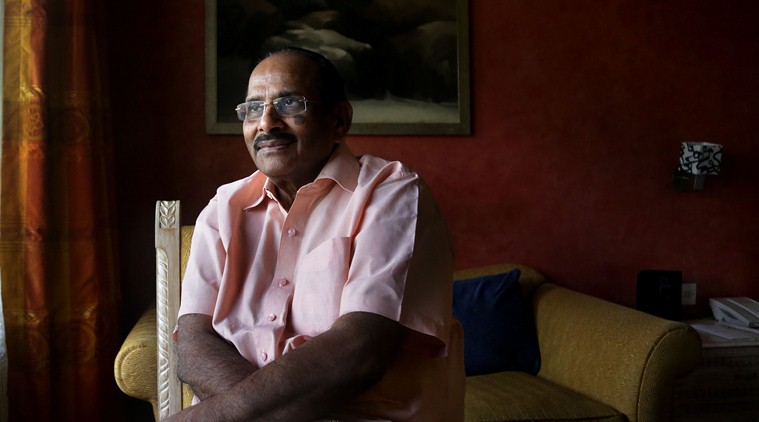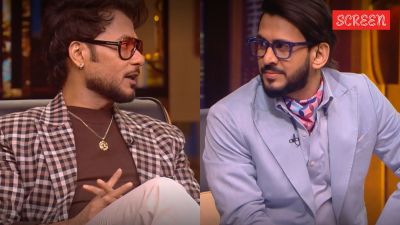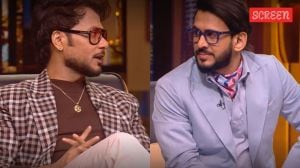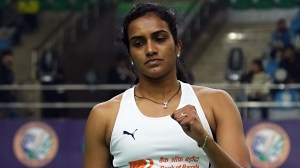Why did Katappa Kill Baahubali?
V Vijayendra Prasad has the answer. The screenwriter on his partnership with his son SS Rajamouli, writing fantasy and his next film on the Rani of Jhansi.
 At 75, Vijayendra Prasad from Hyderabad is at the peak of his four-decade-long and fairly successful career. (Express Photo by Amit Chakravarty)
At 75, Vijayendra Prasad from Hyderabad is at the peak of his four-decade-long and fairly successful career. (Express Photo by Amit Chakravarty)
Conviction. It’s the most important element in V Vijayendra Prasad’s screenplays. In Eega, conviction made it possible for a man to be reborn as a fly to avenge his killer and save his lady love. In Bajrangi Bhaijaan, it helped an Indian sneak across the border and find the mother of a mute girl in a country of millions. With Baahubali, well, it got a Telugu costume drama franchise to break all box-office records and become a pop culture phenomenon.
“But for conviction, it would all have looked shallow,” says Vijayendra Prasad, smiling. “I grew up reading the Ramayana and Mahabharata. If all that really happened, it’s wonderful. But if it didn’t, it’s great imagination, isn’t it? Whether or not one believes in them, they make for great stories because everything fantastical is told with such great conviction. And that’s what I try to bring to my storytelling as well.”
 Conviction is the most important element in Vijayendra Prasad’s screenplays. (Express Photo by Amit Chakravarty)
Conviction is the most important element in Vijayendra Prasad’s screenplays. (Express Photo by Amit Chakravarty)
At 75, the screenwriter from Hyderabad is at the peak of his four-decade-long and fairly successful career. In the last nine years, he has delivered some of the biggest hits, including Magadheera (2009), Eega (dubbed as Makkhi in Hindi, 2012), Bajrangi Bhaijaan (2015), Baahubali: The Beginning (2015) and Baahubali 2: The Conclusion. His next Bollywood project, Kangana Ranaut’s ambitious biopic of Rani Laxmibai, Manikarnika, is gearing for a June release.
Vijayendra Prasad came to films at a rather late age, and in a state of desperation. “I was a successful failure before I became a screenwriter,” he says, laughing. Born into privilege, he failed at several businesses initially. But when his family fell upon bad times after his father’s death, Vijayendra Prasad followed his elder brother, Siva Shakthi Datta (lyricist and father to music director MM Kreem), into films. “He had aspirations of being a director and we sold everything to make his dream come true,” he says. However, when they couldn’t complete the film, Vijayendra Prasad and his brother turned ghost writers, working on screenplays for many producers.
Their first (credited) film was Janaki Ramadu in 1988. With Nagarjuna in the lead, the film was directed by the legendary Telugu filmmaker K Raghavendra Rao. It told the story of two lovers who die only to be reunited in their next lives. The film was a hit and it gave the brothers a foothold in the industry. A few years later, Siva Shakthi Datta decided to retire and Vijayendra Prasad began his journey as a solo screenplay writer. Through the Nineties, he worked with several filmmakers, scripting Telugu and Kannada films with commercial plots, most of which were well-received.
He also wrote the script for son SS Rajamouli’s directorial debut Simhadri (2003), and since then, the duo has mostly worked together, delivering blockbusters such as Vikramarkudu (2006, remade in Hindi as Rowdy Rathore) and Magadheera (2009). Rajamouli attributes his artistic vision to his father. “I assisted him at screenwriting for many years before I became a director. From him, I learnt the sense of drama, the emotional drive of characters that can make the most unbelievable stories feel real. He can tell a love story between a stick and a stone and make the audience feel empathy towards them. It’s something that comes naturally to him,” says Rajamouli.
 Vijayendra Prasad believes a lot of his fame has to do with his son SS Rajamouli (Express Photo by Amit Chakravarty)
Vijayendra Prasad believes a lot of his fame has to do with his son SS Rajamouli (Express Photo by Amit Chakravarty)
According to Vijayendra Prasad, the trick is in finding the human connect. Giving the example of Eega, he says, “A fly is ugly and annoying, yes. But if a fly can irritate you and me, it can also trouble the villain. When a fly becomes a device, I have to work towards making it more ‘human’.”
Vijayendra Prasad believes a lot of his fame has to do with his son, who is his closest collaborator. “Every writer has a vision and most directors are able to match it but only up to 70 per cent. Rajamouli not only gets it cent per cent but takes it a few notches higher,” says the writer. Citing an example, he recounts, “We all know Baahubali is like a son to Katappa. Yet he is the one who betrays him. In my screenplay, Katappa kills him because he asked to by Sivagami, who he is most loyal to. But when Rajamouli saw the script, he changed that. In the new version, Sivagami tells him, ‘Either you kill Baahubali or I will have to’, which leaves him with no choice. So if anyone should be credited with having the answer to the now-famous question ‘Katappa ne Baahubali ko kyun maara?’, it’s Rajamouli.”
Rajamouli says that Baahubali is a version of a story from Mahabharata that his father used to tell him as a child, about two great warrior brothers, one of whom is jealous of the other. However, Vijayendra Prasad sees Baahubali as the story of Sivagami and Devasena, Baahubali’s mother and wife, respectively. “But our masculine society would not have accepted a movie named after women, so I fooled the men by calling it Baahubali,” he says, adding, “Sivagami has shades of both Kunti and Kaikeyi. Nakul and Sahdev were not Kunti’s own children but she loved them as much as she loved the others, and Kaikeyi is the misled mother who banished her favourite son from the kingdom. Devasena, on the other hand, is a warrior like Sita.”
While a large number of his films are costume dramas and reincarnation sagas, Vijayendra Prasad’s stories are essentially family entertainers, something he attributes to his own relationship with his family. Perhaps, the only exception is Rajanna (2011), a film he directed. Based on the Razakars, it tells the story of a fictional hero who helps people overthrow an oppressive leader. “While growing up, I heard of the Razakars and their leader Qasim Rizvi. They were opposed to Hyderabad’s accession to the Union of India after Independence and forcibly converted Hindu Dalits to Muslims. They would torture the people, force beef into their mouths, rape the women. And the insensitive upper-caste Hindus would then refuse to accept these people as Hindus. Qasim Rizvi’s stories were so horrific that they stayed with me,” he explains.
 While a large number of his films are costume dramas and reincarnation sagas, Vijayendra Prasad’s stories are essentially family entertainers. (Express Photo by Amit Chakravarty)
While a large number of his films are costume dramas and reincarnation sagas, Vijayendra Prasad’s stories are essentially family entertainers. (Express Photo by Amit Chakravarty)
While Vijayendra Prasad asserts that he has no interest in the political telling of social stories, word in Bollywood is that he is part of a mega project, “a historical”, that will tell the story of the RSS and its leaders such as KB Hedgewar and MS Gowalkar. The writer, an admirer of VS Savarkar, refuses to comment on the existence of such a plan.
He is not entirely removed from the socio-political at a personal level. Very early in his career, he dropped ‘K’ from his name, KV Vijayendra Prasad, because “it was an indicator of my caste”. “The caste system is at the root of most problems our country faces. I want it eradicated but it’s not enough to preach without practising it.”
The reticent, mostly reclusive writer was in Mumbai on one of his many visits. An early riser, he is ready by 9 am for a slew of meetings. A few weeks ago, he was in Bikaner on the sets of Manikarnika and returned impressed to see his vision being realised on screen. The story of Rani Laxmibai, he says, is very special to him. “It’s a story of misfortune and valour. Born Manikarnika Tambe, she married a much older man, which is when her name was changed. She gave birth to a son, who died. Around the time she adopted a son, her husband died, and she was left to fight the British alone,” says Vijayendra Prasad, who also named his daughter after the queen.
He admits that he wasn’t aware that Ketan Mehta was earlier making the film with Ranaut. “I found out only after he filed the case,” he says. Mehta had sent a legal notice to Ranaut, accusing her of hijacking his research and concept. Vijayendra Prasad dismisses the controversy that followed, when members of the Sarva Brahmin Mahasabha wrote to the makers, expressing concern about the on-screen depiction of the queen. “How can I malign a character that has been an inspiration to me?” he says.
These stray instances, he adds, have not deterred him from working in Bollywood. “It’s been a great experience; I feel like my career has only begun now.”
- 01
- 02
- 03
- 04
- 05































